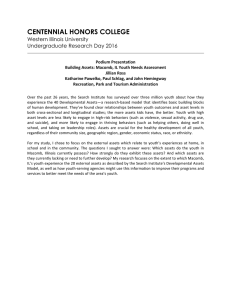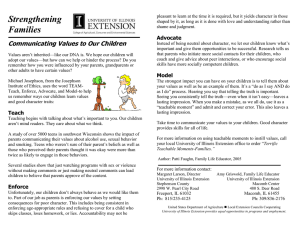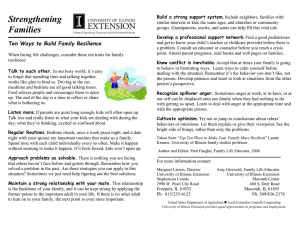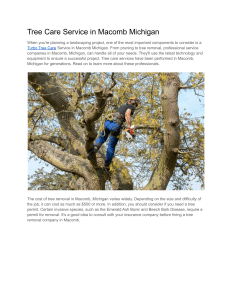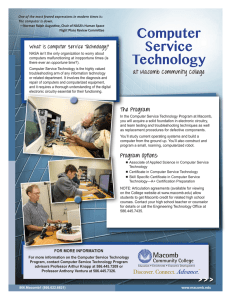/jsw/downloads/4103.doc
advertisement
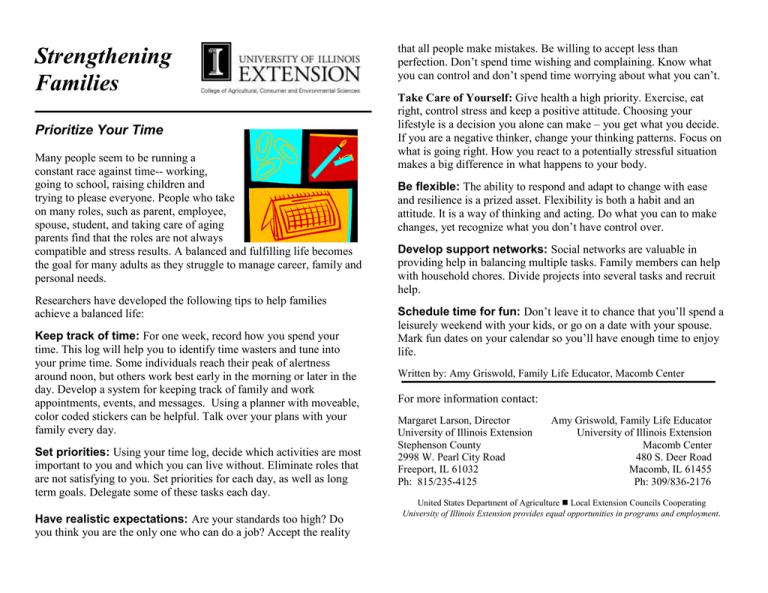
Strengthening Families Prioritize Your Time Many people seem to be running a constant race against time-- working, going to school, raising children and trying to please everyone. People who take on many roles, such as parent, employee, spouse, student, and taking care of aging parents find that the roles are not always compatible and stress results. A balanced and fulfilling life becomes the goal for many adults as they struggle to manage career, family and personal needs. Researchers have developed the following tips to help families achieve a balanced life: Keep track of time: For one week, record how you spend your time. This log will help you to identify time wasters and tune into your prime time. Some individuals reach their peak of alertness around noon, but others work best early in the morning or later in the day. Develop a system for keeping track of family and work appointments, events, and messages. Using a planner with moveable, color coded stickers can be helpful. Talk over your plans with your family every day. Set priorities: Using your time log, decide which activities are most important to you and which you can live without. Eliminate roles that are not satisfying to you. Set priorities for each day, as well as long term goals. Delegate some of these tasks each day. Have realistic expectations: Are your standards too high? Do you think you are the only one who can do a job? Accept the reality that all people make mistakes. Be willing to accept less than perfection. Don’t spend time wishing and complaining. Know what you can control and don’t spend time worrying about what you can’t. Take Care of Yourself: Give health a high priority. Exercise, eat right, control stress and keep a positive attitude. Choosing your lifestyle is a decision you alone can make – you get what you decide. If you are a negative thinker, change your thinking patterns. Focus on what is going right. How you react to a potentially stressful situation makes a big difference in what happens to your body. Be flexible: The ability to respond and adapt to change with ease and resilience is a prized asset. Flexibility is both a habit and an attitude. It is a way of thinking and acting. Do what you can to make changes, yet recognize what you don’t have control over. Develop support networks: Social networks are valuable in providing help in balancing multiple tasks. Family members can help with household chores. Divide projects into several tasks and recruit help. Schedule time for fun: Don’t leave it to chance that you’ll spend a leisurely weekend with your kids, or go on a date with your spouse. Mark fun dates on your calendar so you’ll have enough time to enjoy life. Written by: Amy Griswold, Family Life Educator, Macomb Center For more information contact: Margaret Larson, Director University of Illinois Extension Stephenson County 2998 W. Pearl City Road Freeport, IL 61032 Ph: 815/235-4125 Amy Griswold, Family Life Educator University of Illinois Extension Macomb Center 480 S. Deer Road Macomb, IL 61455 Ph: 309/836-2176 United States Department of Agriculture Local Extension Councils Cooperating University of Illinois Extension provides equal opportunities in programs and employment .
